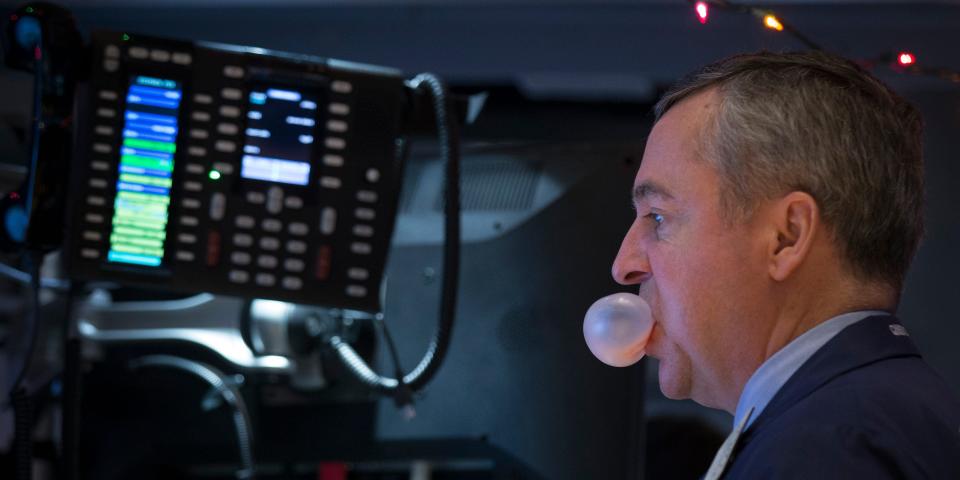
-
Experts including David Rosenberg and analysts at Wall Street banks including Bank of America have compared the AI stock boom to the dotcom bubble that burst in 2000.
-
Meanwhile, Wharton’s Jeremy Siegel and Wedbush Securities’ Dan Ives don’t think that will be the case.
-
Here’s a selection of the latest expert opinion on this year’s AI stock market boom.
The stunning rally in AI-related stocks this year has taken even stock bulls by surprise, but its dizzying speed and investor frenzy around AI invite unflattering comparisons to the dotcom bubble of the late ‘s. 1990.
Market experts including veteran economist David Rosenberg and experts from Wall Street names such as Bank of America, UBS and TAM Asset Management have compared the surge in AI tech stocks to the rise of internet-related stocks towards the end of the 20th century – which finally ended with the stock market crash of 2000.
The tech-heavy Nasdaq 100 index has jumped 39% so far this year, fueled mainly by massive rallies in AI-related stocks such as Nvidia, Alphabet and Microsoft. Nvidia jumped 192%, prompting comments suggesting the stock may be overvalued.
But not everyone thinks the AI stock boom has gone too far. Wharton professor Jeremy Siegel said he doesn’t see the hype around the sector as a bubble and Tradier CEO Dan Raju told Insider that “the discussion around a bust of the IA is baseless at this point.”
Here’s a selection of the latest expert opinion on the rise in AI-related stocks.
Michael Hartnett, Bank of America
Michael Hartnett, CIO of BofA Global Research, said AI is in a “baby bubble” at the moment and noted that “AI = Internet”.
Asset bubbles, whether in the “good stuff” like the internet or the “bad stuff” like housing, are always triggered by easy money and ended by interest rate hikes in the Federal Reserve, he said.
James Penny, TAM Asset Management
James Penny, the company’s CIO, said “companies that even mention the word AI in their earnings see their stock price go up” and it “smells very much like the dot-com era.”
“I think the market has gone a little over its skis. I’d put a lot more odds on it coming from here,” he told Bloomberg.
Art Cashin, UBS
“I think AI is going to be a new mini version of the dot-com,” UBS’s Art Cashin told CNBC. “Everything you hear is going to have an AI inflection, everything from new drugs and drugs, to predictive natures of all types. It’s going to be interesting.”
David Rosenberg, Rosenberg Research
“This kind of corporate behavior isn’t too different from what happened in the dotcom bubble, with company after company satisfying investors’ appetite for information on how it plans to integrate the internet into its activities – or increasing stocks simply because they added ‘.com’ to the name,” wrote veteran economist David Rosenberg.
Dan Ives, Wedbush Securities
Wedbush’s Dan Ives strongly disagrees that tech stocks are on the verge of a dot-com asset bubble or meltdown given their valuations. He believes the industry is ready for a “1995 moment” similar to the boom that followed the advent of the internet.
“With massive cost cutting across the tech sector over the past 9 months, stable business spending and a resilient consumer, we believe the stage is set for a ‘1995 moment’ as AI is the most transformational technology we have seen since the internet began to take shape,” he wrote.
Jeremy Siegel, professor of finance at Wharton
Nor does the retired Wharton finance professor see the AI hype as a bubble. In the dot-com era, there were “huge valuations of companies that had no earnings,” he said.
Dan Raju, CEO of Trader
Dan Raju, CEO of the fintech and brokerage, said it’s wrong to think of AI adoption as similar to the dotcom bubble.
“In 1999, corporate valuations and crazy P/E ratios were based on totally unproven theories of immediate accomplishments around the internet by companies that never materialized,” he wrote in comments. emailed to Insider.
In contrast, “in 2023, we are seeing the benefits of AI being realized ‘here, now’ by enterprises. The adoption curve is still in its early stages, but enterprise P/E is still in the sphere of reason.”
Read the original article on Business Insider

